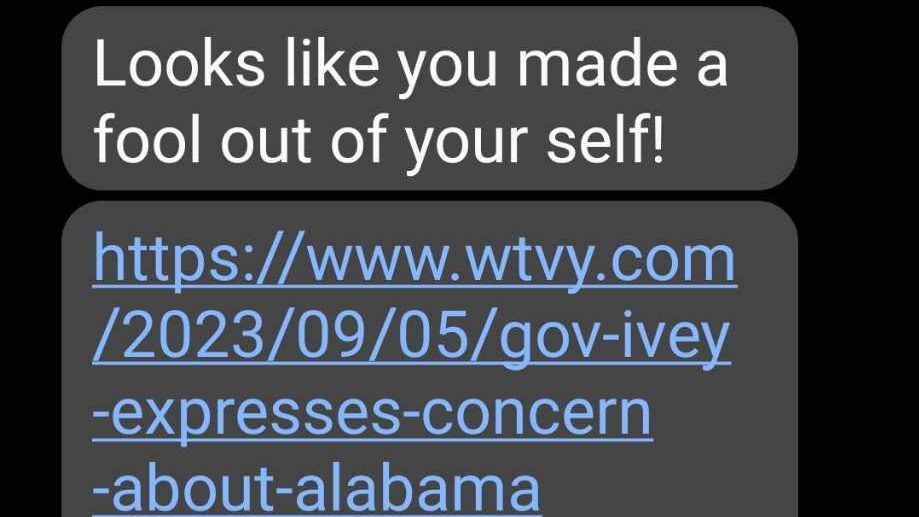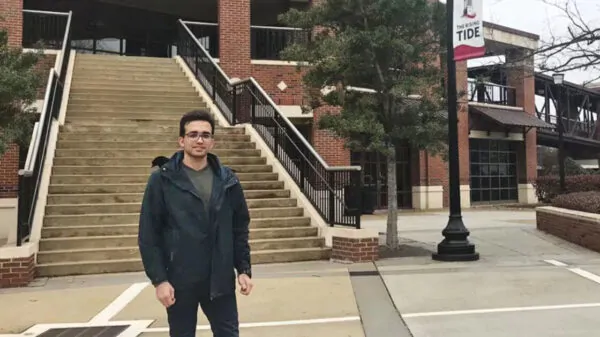|
Getting your Trinity Audio player ready...
|
Ozark citizen Bryant Fontenot asked the Ozark City Council Tuesday night to consider a motion to censure Mayor Mark Blankenship.
Fontenot told the council that it should censure Blankenship due to the mayor’s contact with a citizen in connection with the community’s debate over Blankenship’s call to defund the Ozark Dale County Public Library unless it moved all LGBTQ+ books to the adult section.
“The First Amendment is first because it is supreme,” Fontenot told the council, and quoted a court opinion that “debate on public issues should be uninhibited” and that public discussion “may well include caustic and sometimes unpleasantly sharp attacks on public and government officials.”
Noting that the library called a special meeting after “an informal request” by the mayor to move the books, citizen Adam Kamerer made a request to Library Director Karen Speck under the authority of the Alabama Open Records Act for communications between she and the mayor, and any other public officials, regarding potential defunding of the library or moving LGBTQ+ books.
Kamerer began to read these text messages aloud at that same special called meeting of the library board, before a citizen complained that it amounted to a personal attack.
Lori Blankenship, Mark Blankenship’s wife, could be heard yelling above the fray, saying “He didn’t start with the first text.”
The board ultimately took a 20-minute break before Kamerer finished his three-minute allotment for public comment, and under advisement of law enforcement, decided not to let Kamerer finish reading the texts aloud. He later published the texts on social media and released them to traditional media, including a comment by board member Monica Carroll stating she would “bring a match” in response to how to move the LGBTQ+ books.
Carroll has since offered a lengthy public apology through Facebook.
Blankenship, however, sent Kamerer a Facebook message including a screenshot of an email Blankenship had received, which sources identify as being from Southeast Star editor Pierre Little, advising that the text messages should be considered private communications and offered that the “library had no protections.”
“Hope you have a good lawyer!” Blankenship said after sending the screenshot.
Fontenot did not expressly identify this conversation, but told the council that “recently discovered conversations and other remarks” by Blankenship are cause for concern.
“The recently discovered conversations and other remarks by Mr. Blankenship toward citizens debating his stance on this matter of our public library show at least a gross illiteracy of our first amendment history, or at worst, disregard willfully,” Fontenot said.
Brenda Simechak, council president, informed Fontenot at the meeting that she has heard similar calls from members of the public but noted that “the same way there is a procedure for the library, there is a procedure for what you are calling for, and it has to be initiated by the people; it is not initiated by the council.”
That statement was incorrect; and Simechak responded to APR to note that she had been mistaken during that comment
“I knew that from reading social media, someone might ask for a recall or other action, and everything I read beforehand was that actions against elected officials had to be initiated by voting members of the public,” Simechak said. “I did see that censure was a part of parliamentary procedure, but I mistakenly interpreted it as an action that would have to be asked for by members of the public before we as a council could even consider it. I do plan on letting the members know everything that has been learned of the procedure and what the ramifications of it are, so that if they feel that is an avenue they wish to pursue, what would need to happen. I do plan on letting Mr. Fontenot, the gentleman that initially brought it up, what has been learned as well.”
Lori Lein, counsel for the Alabama League of Municipalities, explained to APR that there is no strict protocol for censure in the state, although councils are certainly within their rights to take a vote that could express disapproval or reprimand of a mayor. Such an action would not carry any other penalty than a public show of condemnation from the fellow governing members.
Lein also clarified that there is no procedure for recall in Alabama except for an extremely unique situation in Dothan do to a particular form of government there; and even then, Lein said a recall attempt may not meet constitutional muster.
Some members of the Ozark public have been considering a recall campaign against Blankenship due to his handling of the situation and may have been working off of the information specific to Dothan, as Lein said she often fields calls about recall due to search engine results directing people to the very specific statutes for that municipality.
After Fontenot spoke out at the council meeting about his view that the mayor’s interactions with members of the public have been inappropriate, Blankenship sent him a message just hours later.
“Looks like you made a fool out of yourself!” Blankenship said, followed by a link to an article about Gov. Kay Ivey’s letter expressing concerns about Alabama libraries.
“Mark Blankenship is the most unstatesmanlike politician to soil our mayoral office within my recall,” Fontenot said in a public message regarding the text. “In closing, at some point, censure will be supported sufficiently by the citizenry to compel council actions or this intemperate little man will feel emboldened.
“I’m not bullied, intimidated, nor threatened; I’ve had far tougher times wiping the soiled butt of a toddler … alas, this has a curious kinship to that … equal amounts of thrashing, kicking, squealing, squawking and cleaning up a pile of mess … but hang in there little fella … that hiney’s coming clean.”






















































